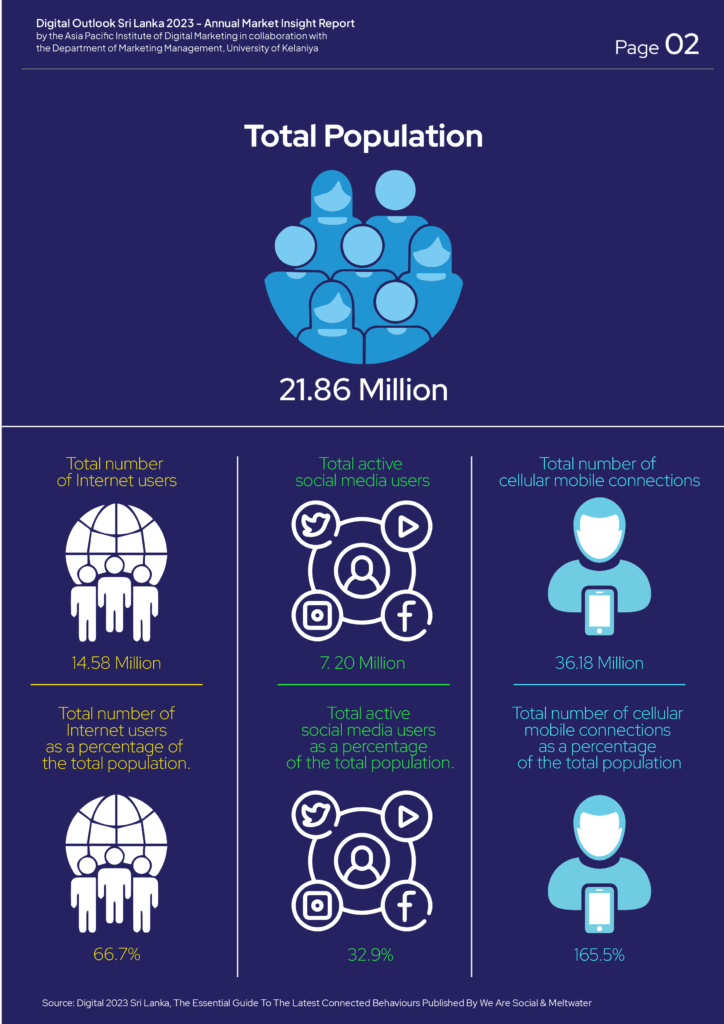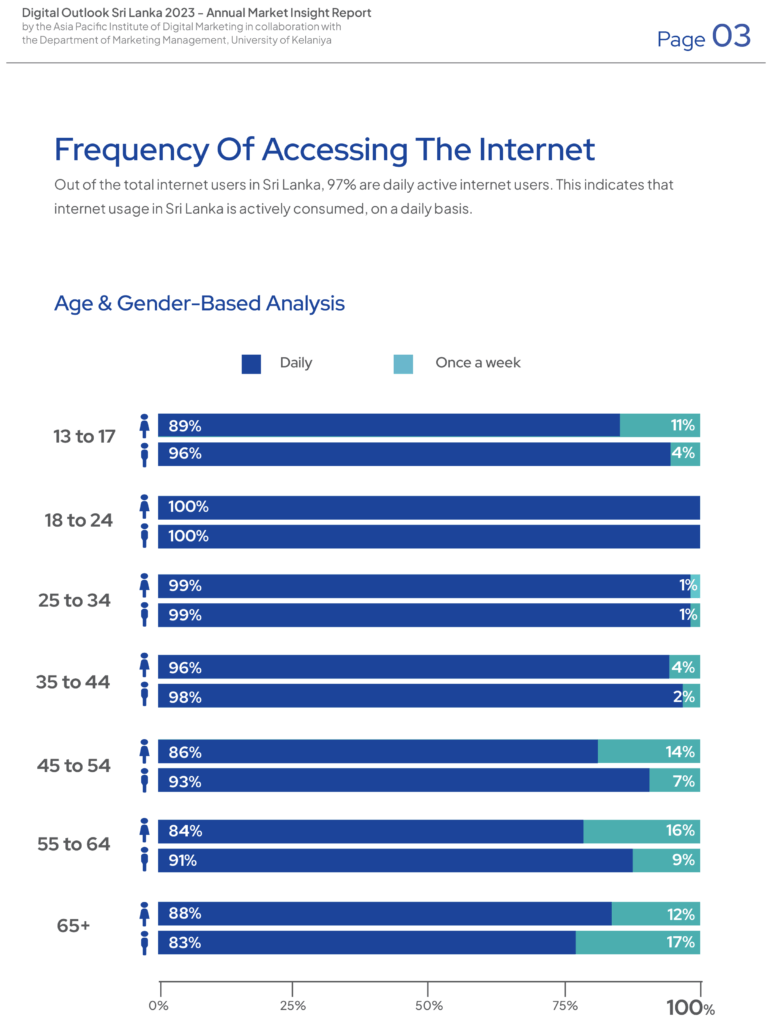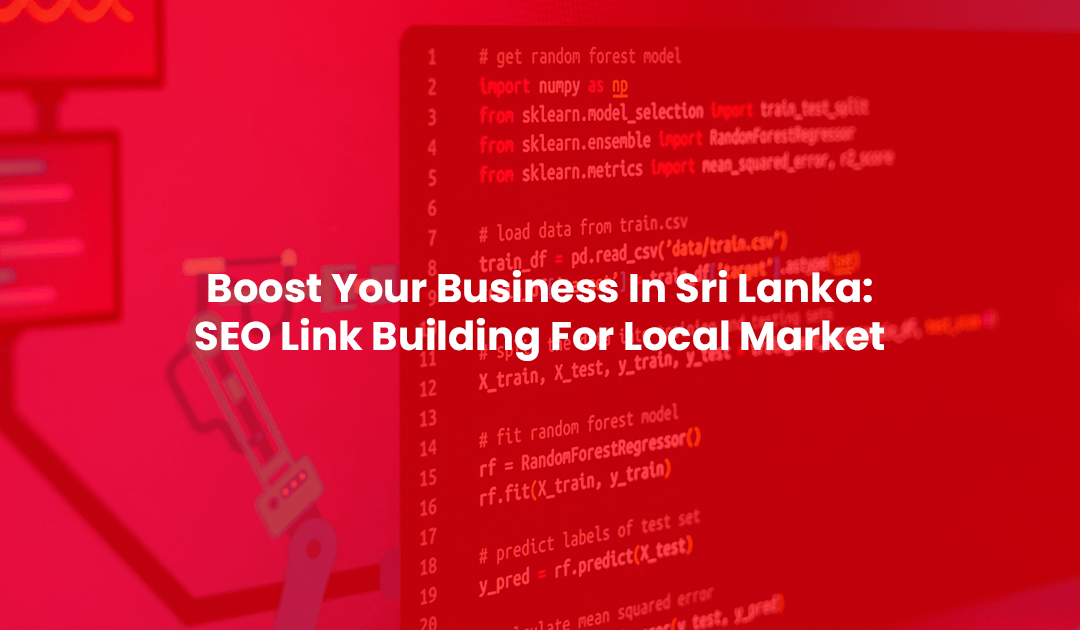The digital age has transformed the business landscape globally, and Sri Lanka is no exception.
As an increasing number of consumers turn to online platforms for their needs, businesses lacking a robust online presence risk being left behind.
SEO, and in particular, link building, has emerged as a pivotal strategy to ensure that local enterprises not only survive but also thrive in this digital era.
According to the “Digital Outlook 2023” report by APIDM, 14.58 million people in Sri Lanka had internet access in 2023 out of a total population of 21.86 million, indicating a penetration rate of 66.7%. Intriguingly, only 7.20 million people are active on social media platforms, accounting for 32.9% of the total population.

This suggests that merely having an active social media presence isn’t enough to capture the attention of all internet users. Therefore, owning a website and ensuring its high ranking on Google (given that Google is the primary search engine used by Sri Lankans) becomes crucial for any business.
By not striving to elevate your website’s position in Google’s search results pages, you’re essentially leaving money on the table.
While Search Engine Optimization encompasses various facets like Technical SEO and On-Page SEO, this post will focus on a specific topic that can significantly boost your visibility on search engines: LINK BUILDING for local websites!
The Digital Landscape In Sri Lanka
Overview Of Internet Usage And Online Businesses In Sri Lanka
Sri Lanka has experienced remarkable growth in its digital landscape. A significant portion of the population accesses the web via mobile devices.
Despite this surge in online activity, only 7.20 million engage on social media platforms. Impressively, over 83% of all internet users browse the web daily.
This figure is even more pronounced among younger demographics: 99% of those aged 25-34 and a full 100% of the 18-24 age group access the internet every day. No age group reports more than 17% weekly internet usage, underscoring the daily digital habits of the majority.

In terms of traditional media consumption, the digital shift is evident. On average, 32% of Sri Lankan internet users spend 1−2 hours watching TV, while 27% allocate below 30 minutes to television viewing.
Notably, 29% of users have stated that they do not watch TV at all. This digital pivot has spurred a proliferation of local businesses establishing their presence online, from e-commerce platforms to local blogs.
The Untapped Potential Of SEO In The Sri Lankan Market
While many businesses have transitioned online, not all have fully optimized their digital presence. SEO remains a largely untapped resource, with numerous enterprises either unaware of its potential benefits or daunted by its perceived intricacies.
In my analysis of over 1,000 local websites, I observed that the vast majority lack a comprehensive SEO strategy. In fact, fewer than 1% of these websites seemed to have a well-implemented SEO approach.
The root of this issue is twofold. On one hand, there’s a significant knowledge gap between SEO service providers and business owners. Many business proprietors remain oblivious to the true potential of a sound SEO strategy.
On the other hand, a considerable number of agencies appear to operate with outdated SEO knowledge. My findings were alarming: of the 1,000 websites in my sample, 99% seemed to lack modern SEO practices.
Furthermore, upon reviewing SEO package details from over 50 reputed SEO agencies, I was taken aback to find that the majority of these packages reflected a fundamental misunderstanding of contemporary SEO. Many offered outdated services such as Web Commenting, Article Submission, and Web 2.0 property creations.
These are tactics that might have been effective around 2010 but are largely obsolete in today’s SEO landscape. Modern SEO is centered around quality content, user experience, and strategic backlinking. It’s disheartening to see even some of the most prominent names in the digital agency sector offering such outdated packages.
Due to this lack of awareness, clients often invest in these high-priced packages, only to see little to no improvement in their website’s performance.
This situation is truly lamentable!
Why Business Owners Should Prioritize SEO
The Direct Correlation Between SEO, Online Visibility, And Increased Revenue
A well-optimized website doesn’t just improve search engine rankings—it can lead to increased traffic, higher conversion rates, and, ultimately, greater revenue.
With the majority of online experiences beginning with a search engine, businesses that don’t prioritize SEO risk missing out on a significant number of potential customers.
The Long-Term Benefits Of A Robust SEO Strategy
Unlike paid advertising, which ceases to produce results once the budget is exhausted, SEO offers enduring benefits. A well-optimized site can sustain high search rankings for years, ensuring a steady influx of organic traffic and potential customers.
In my productized business, SEO ranks as the second-largest revenue generator for our content writing services. Although we don’t operate in Sri Lanka and primarily target Australian clients, we’ve managed to rank our website for specific keywords.
Over the past two months, we’ve witnessed significant improvements, and SEO has gradually become our second-largest revenue stream. We are confident that within the next year, SEO will emerge as the primary revenue driver for our business.
This growth will enable us to either slash our marketing budget by 50% or reallocate that portion to explore new market strategies. This transformation underscores the unparalleled potential of a well-executed SEO strategy.
Demystifying Link Building For Business Owners
What Is Link Building And Why Is It Crucial?
Link building involves acquiring hyperlinks from other websites that point to your own. These links play a pivotal role in determining how search engines rank websites.
Consider them as endorsements: the more high-quality links your site attracts, the more authoritative and trustworthy it appears to search engines.
In my analysis of 1,000 websites, I categorized them into ten distinct groups. Below, I present the results, showcasing the average number of backlinks for sites within each category.
It’s important to note that I excluded prominent sites like “ikman” from all categories, focusing solely on established business entities. The rationale behind this exclusion is that platforms like “ikman” aren’t typical business sites; they function primarily as listing sites.
| Category | Average Backlinks Count |
|---|---|
| Real Estate | 163 |
| Banking And Finance | 1,044.7 |
| Hospitality And Tourism | 1,011.8 |
| Health And Wellness | 357.7 |
| E-commerce And Retail | 2457.7 |
| Education And Training | 2045.4 |
| Information Technology And Software | 696.7 |
| Manufacturing And Production | 769.8 |
| Media And Entertainment | 2469.6 |
| Fashion And Apparel | 784.2 |
The data underscores a significant trend: many Sri Lankan businesses are not actively engaged in creating backlinks for their websites.
When compared to countries like the USA, Australia, and the UK, these numbers are notably low. However, it’s essential to clarify that I’m not suggesting Sri Lankan websites need an enormous number of backlinks to rank on Google.
What’s needed is a significant number of quality backlinks that act as endorsements for a site to achieve higher rankings.
During my research, I identified several opportunities. There are highly profitable keywords in certain categories that can achieve top rankings with minimal backlinks.
This is because many high-ranking sites lack well-structured content, and not all of them truly deserve their positions. It’s disheartening to observe that some poorly designed and executed sites still manage to secure top spots.
This happens because, in the absence of superior alternatives, Google has to rank the best available option for a specific keyword.
The crux of the matter is that there’s ample room for improvement. If you produce top-tier content, Google will eventually recognize and reward your efforts.
Currently, some sites don’t even align with Google’s guidelines but still achieve high rankings. This is because, in the absence of quality content, Google has to work with the available options.
This situation emphasizes the potential of ranking for highly profitable keywords with minimal backlinks, provided there’s a solid content strategy in place.
Witnessing the current state of the Sri Lankan SEO industry is disconcerting for someone passionate about SEO, like myself.
Quality Vs. Quantity: The Balance Of Backlinks For Optimal Results
While the allure of accumulating numerous links might be strong, it’s crucial to understand that not all links hold the same value.
A few links from credible, authoritative websites can be vastly more impactful than hundreds from subpar sources.
The emphasis should be on fostering meaningful, pertinent backlinks that genuinely enhance value.
Earlier in this article, I highlighted how many agencies still offer outdated tactics like Web 2.0 creations, article submissions, and commenting.
These strategies often result in low-quality links. The previous data showcased the relatively low average backlink numbers for Sri Lankan websites.
The table below further illuminates how, even with these modest link counts, poor-quality backlinks overwhelmingly dominate their link profiles.
| Category | Poor-Quality Links Percentage |
|---|---|
| Real Estate | 48% |
| Banking And Finance | 19% |
| Hospitality And Tourism | 21% |
| Health And Wellness | 28% |
| E-commerce And Retail | 63% |
| Education And Training | 22% |
| Information Technology And Software | 73% |
| Manufacturing And Production | 34% |
| Media And Entertainment | 46% |
| Fashion and Apparel | 78% |
It’s alarming to see some sites heavily invested in outdated tactics like Web 2.0 creations. This trend likely stems from poor agency choices.
It’s baffling to think that in this day and age, businesses would squander time on strategies like Web 2.0 or blog commenting to garner links. The majority of comment links today are rendered ineffective.
They are often tagged as “nofollow,” instructing search engine bots not to consider the link and thereby not to pass any authority. Essentially, these are nullified endorsements.
Yet, astonishingly, some agencies continue to promote commenting as a viable backlink acquisition strategy.
Ethical Link Building: Safeguarding Your Business Reputation
Understanding White Hat Vs. Black Hat Techniques
White Hat SEO encompasses strategies that strictly adhere to search engine guidelines and prioritize human audiences. These are ethical, sustainable practices designed for long-term success.
On the other hand, Black Hat SEO employs tactics that aim to deceive search engines, which can result in penalties or even outright bans.
While Google advises against actively pursuing backlinks, the competitive nature of today’s digital landscape necessitates a proactive approach.
Simply waiting for backlinks to naturally come our way can be a lengthy process. Hence, it’s imperative to engage in legitimate, white-hat link-building strategies to expedite this process without compromising integrity.
The Importance Of Ethical SEO Practices In the Digital Age
Engaging in unethical SEO practices might offer short-term gains, but the risks far outweigh the benefits.
With search engines becoming increasingly sophisticated, it’s more important than ever to adopt sustainable, ethical strategies that prioritize genuine value and user experience.
Local Link Building: Connecting With The Sri Lankan Community
The Significance Of Local SEO For Sri Lankan Businesses
Local SEO focuses on optimizing a business’s online presence to attract more customers from relevant local searches.
For Sri Lankan businesses, this means targeting local consumers by ensuring that their business appears in local searches, map listings, and directories.
Strategies Tailored For The Sri Lankan Market
Local Citations:
Ensure your business is listed in local directories.
Google My Business:
Optimize your Google My Business listing with accurate information, photos, and regular updates.
Local Content:
Create content that resonates with the local audience, such as articles about local events, festivals, or news.
Engage With Local Influencers:
Collaborate with local bloggers or social media influencers for guest posts or joint campaigns.
Local Press Release:
Regularly releasing press statements can help you acquire links from local news sites.
Local Partnerships:
Collaborate with local businesses or organizations in complementary industries for joint promotions or events, which can lead to mutual backlink opportunities.
Sponsor Local Events:
By sponsoring or participating in local events, charities, or community activities, you can often get a link back from the event’s website or promotional materials.
Local Awards And Recognitions:
Participate in or sponsor local awards. Even being nominated or winning can result in backlinks from the awarding organization’s website.
Host Local Workshops Or Webinars:
Offer to host educational sessions on topics related to your industry. This can attract links from local event calendars, schools, or business associations.
Local Scholarships:
Offer a scholarship for local students. This can lead to links from educational institutions or local news outlets covering the scholarship.
Engage In Local Forums And Community Groups:
Participate in local online forums, Facebook groups, or other community platforms. While many of these links might be “nofollow,” they can still drive local traffic and increase brand visibility.
Local Resource Pages:
Create a local resource page on your website, listing local services, attractions, or resources. This can become a reference point for other local businesses or blogs.
While the above is just a snippet from a broader list of backlink strategies, I strongly recommend focusing more on local keywords.
Additionally, it’s crucial to analyze the SERP (Search Engine Results Page) for each keyword you aim to rank for and pinpoint what’s missing. As I’ve previously emphasized, the current top-ranking sites aren’t always the most deserving.
Your best approach is to craft a page that fulfills user intent, offering the most comprehensive and valuable content available. This ensures that Google recognizes and rewards your efforts.
And remember, while we’ve discussed numerous SEO link-building strategies, creating top-notch content remains the premier tactic for securing high-quality backlinks.
Competitor Analysis: Staying Ahead In The Sri Lankan Market
The Importance Of Understanding Your Competitors’ Online Strategies
Analyzing the online strategies of competitors provides businesses with invaluable insights. By identifying gaps in their own approach and uncovering new opportunities, businesses can refine their tactics to secure a competitive advantage.
Tools And Techniques To Identify And Leverage Link-Building Opportunities
Several tools, such as Ahrefs, SEMrush, and Moz, allow businesses to analyze competitors’ backlink profiles, uncover their link-building strategies, and identify potential link opportunities.
A tool like Ahrefs makes this process straightforward. By batch analyzing both your website and those of your competitors, you can gain a comprehensive view of the backlink landscape.
Navigate to the backlinks tab to pinpoint high-quality sites that have linked to your competitors but not to you. Once identified, reach out to these sites and explore opportunities to secure backlinks for your own site.
Preparing For The Future: SEO Trends To Watch
Emerging SEO Trends And Their Implications For Sri Lankan Businesses
Voice Search:
With the rise of voice-activated assistants, optimizing for voice search is becoming crucial. This involves focusing on natural language, question-based queries, and local information.
Mobile-First Indexing:
With a significant portion of Sri Lankans accessing the internet via mobile, ensuring websites are mobile-friendly is more important than ever.
AI And SEO:
Search engines are increasingly using AI to improve search results. Understanding how these algorithms work can provide a competitive edge.
Adapting To Technological Advancements
Staying updated with the latest technological trends and understanding how they intersect with SEO is crucial. This involves continuous learning, testing, and adapting to ensure your SEO strategies remain effective.
Content And Link Building: A Match Made For Success
The Role Of High-Quality, Culturally Relevant Content
Quality content is the foundation of effective link building. By producing content that resonates with the Sri Lankan audience—whether it’s articles, videos, or infographics—you increase the likelihood of earning valuable backlinks.
Tips For Creating Content That Resonates
Understand Your Audience:
Conduct surveys or engage with your audience on social media to understand their interests and concerns.
Highlight Local Stories:
Share success stories of local businesses or individuals.
Stay Updated with Local Trends:
Whether it’s the latest festival, cricket match, or political event, staying updated with local trends can provide a wealth of content ideas.
Measuring Your Success: Beyond Rankings
Key Metrics Sri Lankan Business Owners Should Monitor
While search rankings are essential, other metrics provide a more comprehensive view of your SEO efforts, such as organic traffic, bounce rate, and conversion rate.
Tools To Gauge The ROI Of Your Link-Building Efforts
Using tools like Google Analytics, Google Search Console, and specialized SEO tools can help business owners track their performance, measure ROI, and identify areas for improvement.
Conclusion
SEO and link building are more than just buzzwords—they’re powerful tools that can elevate a business’s online presence and drive tangible results.
For Sri Lankan businesses looking to thrive in the digital age, understanding and leveraging these tools is not just beneficial—it’s essential.
As the digital landscape continues to evolve, staying informed and proactive is the key to success.

